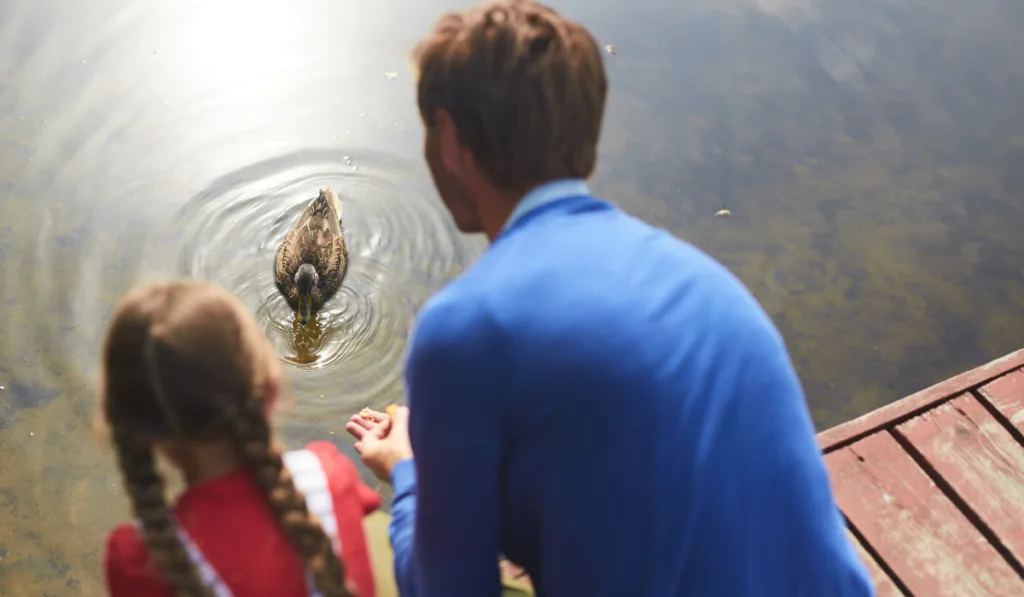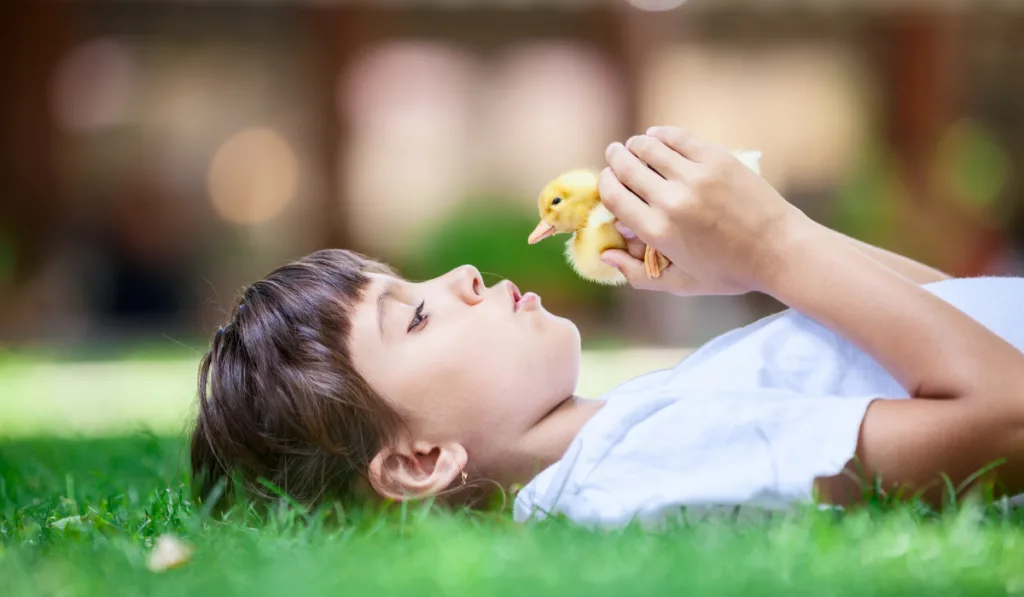Having your ducks run away or go skittish when you are around can be a mood dampener. No one wants to find that their ducks are afraid of them. But it happens, and when it does, learning how to tame a duck will come in handy.
Are your ducks afraid of you? When ducks appear agitated or panicky when a person approaches them, they may be scared of that person. Ducks may show their fear of a person by running away when the person moves toward them. They may also scream in fear when the person handles them.

So, what should you do when your ducks are afraid of you? Learn how to tame a duck!
In the rest of this article, we discuss how you can imprint ducklings on you, why ducklings might be afraid of you, and much more.
Table of Contents
5 Reasons Your Ducklings Might Be Afraid Of You
Your ducklings might be afraid of you for the following reasons:
- Their mother is scared of you. If the mother of your ducklings gets unsettled around you, then there is every chance the ducklings will follow suit.
- You are not approaching them correctly. If you move towards the brooder standing and looking all huge, the ducklings might instinctively be afraid of you. This is even more pronounced when the brooder is closer to the ground than you are. You can avoid this by stooping or crawling as you approach them. Alternatively, you may raise the brooder up higher if possible.
- They are still too young. When ducklings hatch, you have to let them imprint on you so they can get comfortable around you. Imprinting is not an instant process and it may take time before they get used to you.
- You have not been talking enough around them. One of the features ducklings register when you are around them is your voice. But if you barely speak around them, they cannot get used to your sound and may continue seeing you as a threat.
- There is a sudden change in your appearance. Ducklings may get skittish around you if you wear unusual clothes, an unfamiliar hairdo, or make any sudden change to your look.

How to Get Ducklings to Imprint on You (How to Bond With Them)
When ducklings hatch from their eggs, they imprint on the first large animal or object they see. Then, they consider that animal or object as their own species.
For instance, if a duckling sees and spends time with a goat on hatching, it will identify as a goat. Consequently, it will imprint on goats, not just the individual goat it associated with.
Under normal circumstances, when ducklings hatch, the first thing they see is the mama duck.
So, they imprint on their mother and consider her the similitude of their species. In other words, the sight of their mother makes them understand that they are ducks.
However, if the ducklings are hatched in an incubator, and the first thing they see and associate with after hatching is human, they will imprint on humans.
Going by the above, the following describes how to get ducklings to imprint on you:
- Hatch the eggs of the ducklings in an incubator.
- Ensure that the first thing they see and spend time with on hatching is a human. It does not have to be you; it just has to be a human.
Once you have gotten the duckling to imprint on humans, and by extension, you, you must bond with it.
At this point, it is crucial to state the difference between imprinting and bonding. While imprinting happens in the early stages of the life of a duckling, bonding can happen later.
Here is how to bond with ducklings:
- Repeat the same care routine on them every day. Whatever the schedule is, ensure it comes at the same time and in the same order daily. Changing your sequence, even slightly, might startle the birds. Of course, they will not bond with you if they are scared.
- Feed them every day. Ensure the ducklings are fed daily, preferably in line with a roster.
- Carry the ducklings often. Ensure you pick them up, cuddle them, touch them, and snuggle them regularly. This way, you will earn their trust. It is relatively easier to handle ducklings than ducks.
Nonetheless, you should only handle the ducklings as much as they allow you. Doing too much may leave them stressed, thus ruining the bonding process. Still, when picking them up, try to do more each time until they are more comfortable with you.
- Offer the ducklings treat regularly. When offering them these treats, let them feed from your hand when possible. By eating treats from your hands, they become more trusting of you.
- Interact with them. Whenever you are with the ducklings, ensure you talk to them. You may even sing to them. By talking or singing, you are ensuring they become familiar with your voice.
- Play with them. Ducklings will bond with you if you play with them. You may even take things up a notch by getting them toys.
- Keep the living area of the ducklings clean. By keeping their living space free of dirt and germs, you reduce their chances of getting sick. If the ducklings remain healthy, they will be happy, and bonding with them will be easier.
- Let them take baths regularly. Ducklings are waterfowls, so letting them bathe often is a sure way to keep them happy, and it can help with bonding.

How to Teach a Duckling to Come to You
If you have imprinted and properly bonded with your duckling, it will come to you on its own. However, in the absence of these factors, here is how to teach a duckling to come to you:
Train Its Mother to Follow You
The easiest way to get a duckling to come to you is by training its mother to follow you. However, if the duck has no parent, you can try the steps below.
Feed the Duckling Treats Regularly
- To get a duckling to come to you, start by enticing it with treats. Treats such as mealworms and chopped tomatoes are some top options you may try with the ducklings.
- Draw it close to you by flashing the treat in your hands before the duckling.
- Then when it gets close to you, place some of the treats before the duckling, and let it eat.
- When the duckling starts getting more comfortable with you, let it eat the treats directly from your hands. And while it eats, gently stroke or tickle its head.
By following the steps above, your duckling will come to associate the pleasure of treats and tickles with you. Thus, it will always come to you in search of these pleasures.
Teach the Duckling to Respond to Its Name
Besides making yourself a source of delight to it, you can get your duckling to come to you by teaching it to respond to its name.
Here is how to teach your duckling to respond to its name:
- Start by giving it a name. You may want to get creative, come up with something not too serious.
- Whenever you are around the duckling or interacting with it, ensure you call it by that name as often as you can.
- Whenever you address the duckling by its name, use a clear tone. This way, it will know you are referring to it.
- If you have many ducklings, ensure you refer to each one by their different names when interacting with them individually.
- After a while of conditioning the duckling to respond to its name, try calling out to it from afar. If it responds, then you are all good. If it does not, you may have to subject it to more conditioning. Ducks are generally fast learners. So, with time, the duckling will get a handle on the name and respond to it.

How to Calm Down a Duckling
Before worrying about how to calm down a duckling, you should find out why they are agitated.
A duckling may become restless for the following reasons:
- It is not getting enough heat.
- A duckling hatched by a duck may get skittish around you when taken away from its mother.
- If you dress in an unfamiliar way and move towards the duck, they may become agitated.
- It is lonely.
Once you have detected the reason why your duckling is skittish, you may calm them down by doing the following:
- Get a heat lamp if the heat is insufficient.
- If the duckling was hatched by a duck, get another duck to adopt it.
- If there has been a sudden change in your appearance, try reverting to a look the duckling is more familiar with. Then slowly transition to your new look around it.
- If the duckling is lonely, bring in another duckling to keep it company. Alternatively, you may get a mirror as a temporary fix. The reflection of the duckling in the mirror will simulate the presence of another duckling. So, it will feel less lonely.
Final Thoughts
You may never have to worry about how to tame a duck if it imprints on you or bonds with you early enough.
However, in a situation where the duck did not hatch before you or where you adopted it, the tips we shared in this article will guide you in taming your duck.
Resources
- https://thecapecoop.com/understanding-backyard-duck-behavior/
- https://www.tyrantfarms.com/how-to-get-your-ducks-to-like-you-three-tips/
- https://www.backyardchickens.com/threads/why-are-my-ducklings-so-afraid-of-me.424219/
- https://www.backyardchickens.com/threads/please-help-me-my-ducklings-are-terrified-of-me.1096867/
- https://static1.squarespace.com/static/53eea772e4b08ae50e0bf1ab/t/585a67989de4bb73f203487a/1482319770733/ArticleImprintingBondingandAdoptingAGuidetoAddingPetFowltoYourFamily.pdf
- https://www.cuteness.com/article/ducks-show-affection
- https://www.wikihow.com/Train-Ducks
- https://www.backyardchickens.com/threads/my-ducklings-wont-stop-crying-what-do-i-do.1185584/
- https://www.backyardchickens.com/threads/my-ducks-are-skittish.234063/
